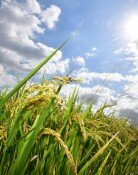Startup farmers are the answer
Startup farmers are the answer
Posted September. 01, 2023 08:34,
Updated September. 01, 2023 08:34
Oh Jang-hoon is the owner of Home Run Farm in Seogwipo, Jeju. He played for 10 years in the minor league of the Korean Baseball Organization and led in most home runs and RBIs during some seasons. However, in 2017, he returned home and took over his father's tangerine farm. The 39-year-old didn't just inherit the family business and introduced smart farming methods to reduce costs by supplying water and fertilizer only when needed. Additionally, he opened an online direct sales channel, doubling sales. “It is fulfilling to be in the farming business, as it pays off for your efforts,” Oh said.
Young farmers such as Mr. Oh are returning to their hometowns to revolutionize the rural town. In particular, young people who are well-versed in information technology and advanced farming methods are evolving into 'agricultural entrepreneurs.' They pass their farming experience and knowledge to other young people and develop and distribute smart farm facilities.
The key to addressing rapid aging and low fertility lies in the hands of young people returning to rural areas. Rather than adhering to traditional agriculture, they are growing new crops that have not been explored. Additionally, some are starting food-tech companies to create high-quality youth jobs, a crucial element often lacking in local communities. Notable examples include 'Booze & Buzz,' a company producing mead—liquor made from honey—using domestic Campbell grapes, and 'Mungyeong Haru,' which crafts handmade desserts using apples and organic ingredients cultivated in Mungyeong, North Gyeongsang Province. Moreover, the emergence of unique processed foods utilizing local agricultural products is garnering attention as return gifts for the Hometown Love Donation Program.
With an increasing number of young farmers with a challenging spirit and growing interest in "K-food" from overseas, the agricultural sector, once a representative domestic industry, is transforming into an export industry. Korean strawberries and stevia tomatoes have garnered premium status as sought-after imported fruits in regions like the Middle East and Southeast Asia. Smart farm factories developed by young Korean agricultural companies are exported to Saudi Arabia and the United Arab Emirates. The global market for smart farms, which is growing at 10% annually, is expected to reach 29 trillion won by 2025. Korea's smart farm technology, which integrates greenhouses with information technology and robotics, is renowned for its remarkable competitiveness among developed countries, owing to its exceptional cost-effectiveness.
The Korean economy, having experienced over three decades of growth propelled by manufacturing exports to China, now confronts substantial challenges arising from the global restructuring of supply chains and China's slowdown. Productive agriculture, which combines high-quality information technology and the export of top-quality agricultural and processed food products, can be the catalyst to overcome these challenges. The government and local governments should support rural communities to promote innovations brought up by young minds.







